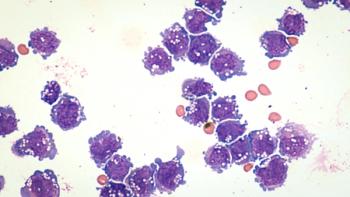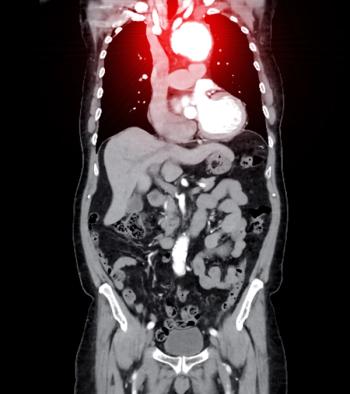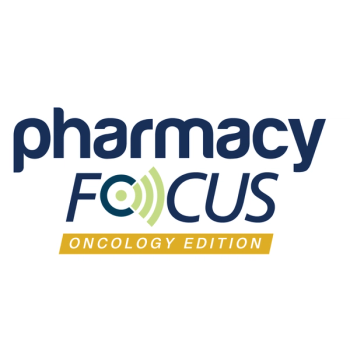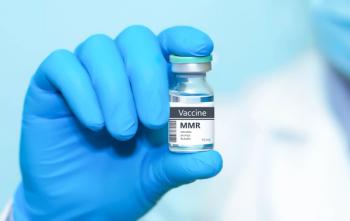
Jose Tinajero, PharmD, BCOP, discusses the results of a retrospective study evaluating patients with B-cell acute lymphoblastic leukemia.

Jose Tinajero, PharmD, BCOP, discusses the results of a retrospective study evaluating patients with B-cell acute lymphoblastic leukemia.

Patients with DLBCL on Medicaid had worse survival outcomes than those on commercial insurance, but there were no statistically significant differences in survival between races.

A recent study found that a weight-adjusted waist index was an independent predictor of all-cause-, cardiovascular-, cancer-, and respiratory-related mortality in patients with asthma.

Bezisterim, an anti-inflammatory insulin sensitizer, will be authorized to proceed to a phase 2 clinical trial.

Discount Drug Mart's new pharmacists are excited about the expanding role of community pharmacy in providing personalized, patient-centric health care.

Mary McGann, PharmD, BCOP, offers insights into CAR T-cell therapy and the crucial role of pharmacists in mitigating resistance.

The risk of late-stage diagnosis was higher for Asian, Black, and Native Hawaiian or Other Pacific Islander adolescent and young adult patients with cancer.

Pharmacy students discuss how they use social media platforms like TikTok, Instagram, and YouTube to reinforce their classroom learning.

Pharmacists should be aware of these digital therapeutics, which are often used as an adjunct to medication, to better understand the treatment outcomes.

Myasthenia gravis is a chronic autoimmune disease that causes muscle weakness and fatigue, with 4 main treatment options available.

High-cost novel therapies challenge payers and patients, while biosimilars help balance affordability.

Cases have been detected in 33 US states so far this year, and the virus has recently hospitalized the former Chief Medical Advisor to the President of the US Anthony Fauci.

Robert Walker discusses the updated COVID-19 vaccines targeting the new JN.1 lineage of the virus and the challenges of addressing vaccine hesitancy to protect individuals and communities.

For those with unexplained pregnancy loss, these results could prove promising improvements to birth outcomes.

The exhaled breath condensate mask was able to successfully monitor and accurately detect breath for nitrate in patients with asthma or chronic obstructive pulmonary disease.

Women's health extends beyond reproductive health, yet much of the research in women's health focuses on these "below the belt" health issues, despite data showing that women disproportionately suffer from certain health conditions, such as heart failure.

The request comes as increased scrutiny is levied toward pharmacy benefit managers for alleged unfair business practices.

Shared clinical decision-making presented drawbacks, resulting in age-based recommendations for adults aged 75 years and older and risk-based recommendations for individuals aged 60-74 years.

Those with an aneurysm diagnosis who were younger than 40 years of age were observed to have an even higher risk.

An examination of the 340B Drug Pricing Program's original intent, current challenges, and potential resolutions in today's complex health care landscape.

Lessons can be learned from Canadian models of influenza vaccine management, including proactive patient conversations and optimal workflows.

The author suggest how to improve the representation of women, older adults, and minorities in clinical research that will require effort from a broad range of stakeholders.

Although small intestinal bacterial overgrowth (SIBO) and irritable bowel syndrome (IBS) share many of the same symptoms, SIBO affects the small intestine and IBS affects the large intestine.

The application includes data from the Vivacity-MG3 study, demonstrating that individuals who received the drug had superior outcomes compared with the standard of care alone.

Pharmacists play an essential role in ensuring the medication is dispensed to patients with high atherosclerotic cardiovascular disease risk.

Despite questions and controversy around some clinical research, new understandings of the pathophysiology of the disease are pushing treatments forward.

Expert shares reasons why many women are behind on their annual breast cancer screenings, along with the latest cutting edge treatments in the breast cancer space.

The findings further the understanding of respiratory virus immune evasion mechanisms and uncover how RSV-NS1 can target therapeutic intervention

Using 1 nicotine-containing electronic cigarette was significantly correlated with an increase in residual volume and total lung capacity in patients with asthma.

Pharmacists can help facilitate more organized efforts to improve measles vaccination uptake for children aged 5 and younger by identifying socio-demographic gaps within this population.